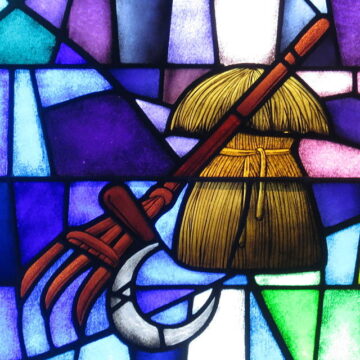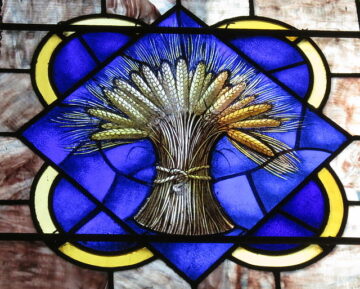Franciscan Friar Fr. Paul Gallagher reflects on the Gospel text for the Sixteenth Sunday of Ordinary Time. Can you take some time to speak with God about whatever has arisen within you as you reflected on these parables?
The content is edited by Franciscan Sister of Christian Charity Sister Anne Marie Lom and Joe Thiel. The excerpts from the Sunday readings are prepared by Joe Thiel. To read or download the complete pdf with excerpts for your prayer, please click here Franciscan Gospel Reflection July 23 2023. Excerpts are from the Lectionary for Mass for Use in the Dioceses of the United States of America, second typical edition © 2001, 1998, 1997, 1986, 1970 Confraternity of Christian Doctrine, Inc., Washington, DC. Used with permission. All rights reserved. No portion of this text may be reproduced by any means without permission in writing from the copyright owner. Photos: Nheyob, CC BY-SA 4.0 <https://creativecommons.org/licenses/by-sa/4.0>, via Wikimedia Commons; Nheyob, CC BY-SA 4.0 <https://creativecommons.org/licenses/by-sa/4.0>, via Wikimedia Commons
Matthew 13:24-43
Jesus proposed another parable to them. “The kingdom of heaven may be likened to a man who sowed good seed in his field. While everyone was asleep his enemy came and sowed weeds all through the wheat, and then went off. When the crop grew and bore fruit, the weeds appeared as well. The slaves of the householder came to him and said, ‘Master, did you not sow good seed in your field? Where have the weeds come from?’ He answered, ‘An enemy has done this.’ His slaves said to him, ‘Do you want us to go and pull them up?’ He replied, ‘No, if you pull up the weeds you might uproot the wheat along with them. Let them grow together until harvest; then at harvest time I will say to the harvesters, “First collect the weeds and tie them in bundles for burning; but gather the wheat into my barn.”‘”
He proposed another parable to them. “The kingdom of heaven is like a mustard seed that a person took and sowed in a field. It is the smallest of all the seeds, yet when full-grown it is the largest of plants. It becomes a large bush, and the ‘birds of the sky come and dwell in its branches.'”
He spoke to them another parable. “The kingdom of heaven is like yeast that a woman took and mixed with three measures of wheat flour until the whole batch was leavened.” All these things Jesus spoke to the crowds in parables. He spoke to them only in parables, to fulfill what had been said through the prophet: “I will open my mouth in parables; I will announce what has lain hidden from the foundation of the world.”
Then, dismissing the crowds, he went into the house. His disciples approached him and said, “Explain to us the parable of the weeds in the field.” He said in reply, “He who sows good seed is the Son of Man, the field is the world, the good seed the children of the kingdom. The weeds are the children of the evil one, and the enemy who sows them is the devil. The harvest is the end of the age, and the harvesters are angels. Just as weeds are collected and burned up with fire, so will it be at the end of the age. The Son of Man will send his angels, and they will collect out of his kingdom all who cause others to sin and all evildoers. They will throw them into the fiery furnace, where there will be wailing and grinding of teeth. Then the righteous will shine like the sun in the kingdom of their Father. Whoever has ears ought to hear.”
Background:
The Gospel text for this Sunday follows directly after the Gospel from last Sunday. Last week the first line of the Gospel described Jesus leaving the house and going down by the sea. This week, after Jesus had addressed the crowd that had gathered, he dismissed them and returned to the house (Matthew 13:36). The first two parables in today’s Gospel are similar to that of last week, centering on agriculture and the sowing of seeds. The parables conclude with the familiar admonition of last week: “Whoever has ears ought to hear.” (Matthew 13:9 and 43b) The repetition of the line indicates its importance.
While there are a number of common elements in the parables in the texts for last week and this week, what stands out is the last parable, which is about a woman doing one of the most ordinary kitchen tasks, making bread. In the male-dominated culture in which Jesus lived, Jesus’ effort to include an example that every woman of the day would understand sends a message to the male-dominated culture of Jesus’s day.
Another cultural aspect to appreciate is the enjoyment that people of the day found in making another look foolish. The Gospels often mention that Jesus’ opponents are posing some questions or situation to Jesus in order to embarrass or trap him.
In the first parable of today’s text, an enemy has come in the night to sow weeds in the midst of the wheat field. In our modern agricultural situations, this may seem unlikely. But for the small plots of land that were farmed by hand in the day of Jesus, maybe this was not so unlikely. Consider that a neighboring farmer may be trying to make his fellow farmer look a bit foolish by sowing weeds in his neighbor’s field, and the attention he will receive when others learn of the trickery. But as the parable unfolds, the foolish farmer becomes the wiser of the two. He was wise enough to know that the weeds were not strong enough to choke off his wheat, and the two were able to grow together. At harvest time, he has both his wheat harvest and the weeds, which are fuel for his fire.
 The parables that Jesus tells in this text reveal a God who is imperceptibly at work in ordinary human ways, a God who at the same time is more powerful than any outside effort to thwart God’s intentions. This God’s kingdom is unfolding in the lives of farmers, women, and even Gentiles.
The parables that Jesus tells in this text reveal a God who is imperceptibly at work in ordinary human ways, a God who at the same time is more powerful than any outside effort to thwart God’s intentions. This God’s kingdom is unfolding in the lives of farmers, women, and even Gentiles.
This Sunday a short form of the Gospel text can be used which would only include the first parable. This option would strengthen a connection to the first reading (Wisdom 12:13, 16-19), but would eliminate the repetition of the line “Whoever has ears ought to hear,” and pass over the reality that Jesus made a significant effort to include women in the way he taught and pointed toward the kingdom, even in his very male-dominated world.
Reflection Questions:
- Do you know people who enjoy playing practical jokes on others? Have you ever been the focus of someone else’s practical joke? What feelings arise within you as you recall that experience?
- What do you think the ordinary peasants of the day were thinking as they heard Jesus tell these parables?
- Whom, in our society, “weeds growing in the midst of the wheat” might symbolize?
- Within you as a person, what values or behaviors might be weeds that are growing among the wheat?
- Who today speaks with the wisdom of the farmer who is willing to let the weeds grow with the wheat?
- Do you ever feel like the kingdom of God is unfolding too slowly?
- Why would Jesus tell parables about the kingdom of God that focused on the experience of the most common of people, including women?
- Can you take some time to speak with God about whatever has arisen within you as you reflected on these parables?



